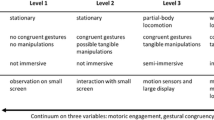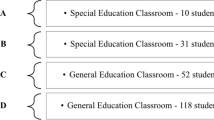Abstract
Embodied Learning involves the development of perceptuo-motor schemas as students manipulate physical objects that embody a concept, or when students move in domain-relevant ways, physically enacting solutions to problems, as well as gesturing as they interact with peers face-to-face. Teaching standards (e.g., for K-12 math education) align with such theories of learning. For instance, teachers are encouraged to have students “talk mathematics”, construct viable arguments and critique the reasoning of others, model with mathematics, and use tools with precision, among others. Yet most learning technologies and tutoring systems are not designed to facilitate embodied learning; instead, they tend to align with more traditional views of student learning. This paper explores possible ways AIED systems can reflect embodied learning theories, within K-12 STEM education. We present the WearableLearning platform as an example that intends to bring embodied learning to mathematics and computing education for students at the K-12 level, with implications and suggestions on how to use Artificial Intelligence to make embodied learning environments more effective.
Access this chapter
Tax calculation will be finalised at checkout
Purchases are for personal use only
Similar content being viewed by others
References
Abrahamson, D., et al.: The future of embodied design for mathematics teaching and learning. In Frontiers in Education, vol. 5, p. 147. Frontiers Media SA, August 2020
Abrahamson, D., Ryokai, K., Dimmel, J.K.: Learning mathematics with digital resources: Reclaiming the cognitive role of physical movement. In: Handbook of Digital (Curriculum) Resources in Mathematics Education. Springer, New York (2023). https://doi.org/10.1007/978-3-030-95060-6_22-1
Aleven, V.: Help seeking and intelligent tutoring systems: theoretical perspectives and a step towards theoretical integration. In: International Handbook of Metacognition and Learning Technologies, pp. 311–335. Springer, New York (2013)
Arroyo, I., Castro, F., Smith, H., Harrison, A., Ottmar, E.: Augmenting Embodied Mathematics Classrooms with Mobile Tutors. AERA 2021 (2021)
Arroyo, I., Closser, A.H., Castro, F., Smith, H., Ottmar, E., Micciolo, M.: The WearableLearning Platform: A Computational Thinking Tool Supporting Game Design and Active Play. Technology, Knowledge and Learning, 1–10 (2022)
Arroyo, I., Cooper, D.G., Burleson, W., Woolf, B.P., Muldner, K., Christopherson, R.: Emotion sensors go to school. In: Artificial intelligence in Education, pp. 17–24. IOS Press (2009). https://doi.org/10.3233/978-1-60750-028-5-17
Harrison, A., Smith, H., Botelho, A., Ottmar, E., Arroyo, I.: For good measure: identifying student measurement estimation strategies through actions, language, and gesture. In: Gresalfi, M., Horn, I.S. (eds.) The Interdisciplinarity of the Learning Sciences, pp. 869–870, June 2020, ISSN: 1573–4552
Arroyo, I., Woolf, B.P., Burelson, W., Muldner, K., Rai, D., Tai, M.: A multimedia adaptive tutoring system for mathematics that addresses cognition, metacognition and affect. Int. J. AI Educ. 24(4), 387–426 (2014)
Bentley, B., Walters, K., Yates, G.C.: Using iconic hand gestures in teaching a year 8 science lesson. Appl. Cogn. Psychol. 37(3), 496–506 (2023)
Boggan, M., Harper, S., Whitmire, A.: Using manipulatives to teach elementary mathematics. J. Inst. Pedagogies 3 (2010)
National Governors Association Center for Best Practices & Council of Chief State School Officers. Common Core State Standards for Mathematics. Washington, DC: Authors (2010)
Clarke, D., Roche, A.: Using contextualized tasks to engage students in meaningful and worthwhile mathematics learning. J. Math. Behav. 51, 95–108 (2018)
Cobb, P., Wood, T., Yackel, E., McNeal, B.: Characteristics of classroom mathematics traditions: an interactional analysis. Am. Educ. Res. J. 29(3), 573–604 (1992). https://doi.org/10.2307/1163258
Klemmer, S.R., Hartmann, B., Takayama, L.: How bodies matter: five themes for interaction design. In: Proceedings of the 6th Conference on Designing Interactive Systems, pp. 140–149, June 2006
Lindgren, R., Johnson-Glenberg, M.: Emboldened by embodiment: Six precepts for research on embodied learning and mixed reality. Educ. Res. 42(8), 445–452 (2013)
Melcer, E.F., Isbister, K.: Learning with the body: a design framework for embodied learning games and simulations. In: Software Engineering Perspectives in Computer Game Development, pp. 161–195. Chapman & Hall/CRC (2021)
Misirli, O., Ergulec, F.: Emergency remote teaching during the COVID-19 pandemic: parents experiences and perspectives. Educ. Inf. Technol. 26(6), 6699–6718 (2021)
Nathan, M.: Foundations of Embodied Learning: A Paradigm for Education. Routledge (2021)
Novack, M., Goldin-Meadow, S.: Learning from gesture: how our hands change our minds. Educ. Psychol. Rev. 27, 405–412 (2015)
Poh, A., Castro, F. E.V., Arroyo, I.: Design principles for teacher dashboards to support in-class learning. In: Proceedings of the International Conference of the Learning Sciences. International Society of the Learning Sciences (2023)
Rasul. I., Crabtree, D., Castro, F., Poh, A., Gattupalli, S., Kathala, K., Arroyo, I.: WearableLearning: developing computational thinking through modeling, simulation and computational problem solving. In: Proceedings of the International Conference of the Learning Sciences. Int. Soc. of Learning Sciences (2023)
Crabtree, D., Rasul, I., Arroyo, I.: Implementing WearableLearning in the math classroom: an exploration into the affordances of embodied learning through game-play compared to traditional learning technologies. In: Proceedings of the International Conference of the Learning Sciences. Int. Soc. of Learning Sciences (2024)
Schoenfeld, A.H.: Learning to think mathematically: problem solving, metacognition, and sense making in mathematics. J. Educ. 196(2), 1–38 (2016)
Schworm, S., Renkl, A.: Computer-supported example-based learning: When instructional explanations reduce self-explanations. Comput. Educ. 46(4) (2006)
Newen, A., De Bruin, L., Gallagher, S. (eds.): The Oxford Handbook of 4E Cognition. Oxford University Press (2018)
Shute, V., Wang, L.: Assessing and supporting hard‐to‐measure constructs in video games. In: The Wiley Handbook of Cognition and Assessment: Frameworks, Methodologies, and Applications, pp. 535–562 (2016)
Smith, H., Harrison, A., Ottmar, E., Arroyo, I.: Developing Math Knowledge and Computational Thinking Through Game Play and Design: A Professional Development Program. Contemporary Issues in Technology and Teacher Education 20(4) (2020). https://www.learntechlib.org/p/215216/
Smith, H., Rushton, N. Reis, S., Behning, C., Ottmar, E., Smith, G.: Wearable Learning Teacher Curriculum, 17 February 2023. Retrieved from osf.io/d7uhv
Wilson, R.A., Foglia, L.: Embodied cognition. Stanford Encyclopedia of Philosophy (2011)
Yackel, E., Cobb, P., Wood, T.: Small-group interactions as a source of learning opportunities in second-grade mathematics. J. Res. Math. Educ. 22(5), 390–408 (1991)
Razzaq, R., Ostrow, K.S., Heffernan, N.T.: Effect of immediate feedback on math achievement at the high school level. In: Proc. of the International Conference on AI in Education, pp. 263–267. Springer, Cham, June 2020. https://doi.org/10.1007/978-3-030-52240-7_48
Ochoa, X., Lang, C., Siemens, G., Wise, A., Gasevic, D., Merceron, A.: Multimodal learning analytics-Rationale, process, examples, and direction. In: The Handbook of Learning Analytics, pp. 54–65 (2022)
van De Sande, B.: Properties of the Bayesian knowledge tracing model. J. Educ. Data Mining 5(2), 1–10 (2013)
Liu, Y.: Tangram Race Mathematical Game--Combining Wearable Technology and Traditional Games for Enhancing Mathematics Learning, Masters Thesis, Worcester Polytechnic Institute (2014)
Valente, R.C.: Teaching students mathematical embodiment techniques using online learning game platform (WLCP). Interactive Qualifying Project. Worcester Polytechnic Institute E-Projects Library (2019)
Author information
Authors and Affiliations
Corresponding author
Editor information
Editors and Affiliations
Rights and permissions
Copyright information
© 2024 The Author(s), under exclusive license to Springer Nature Switzerland AG
About this paper
Cite this paper
Arroyo, I. et al. (2024). Aligning AIED Systems to Embodied Cognition and Learning Theories. In: Olney, A.M., Chounta, IA., Liu, Z., Santos, O.C., Bittencourt, I.I. (eds) Artificial Intelligence in Education. Posters and Late Breaking Results, Workshops and Tutorials, Industry and Innovation Tracks, Practitioners, Doctoral Consortium and Blue Sky. AIED 2024. Communications in Computer and Information Science, vol 2150. Springer, Cham. https://doi.org/10.1007/978-3-031-64315-6_1
Download citation
DOI: https://doi.org/10.1007/978-3-031-64315-6_1
Published:
Publisher Name: Springer, Cham
Print ISBN: 978-3-031-64314-9
Online ISBN: 978-3-031-64315-6
eBook Packages: Computer ScienceComputer Science (R0)




